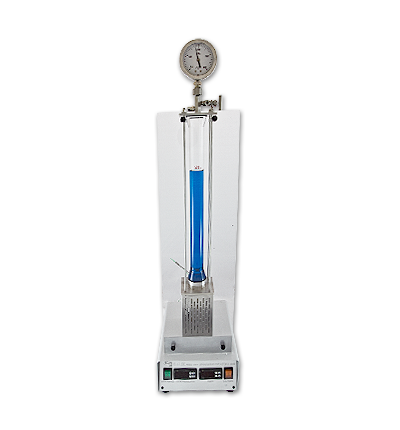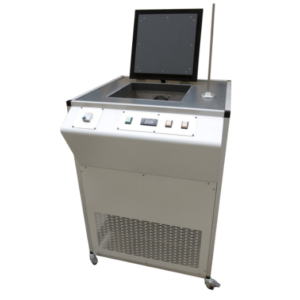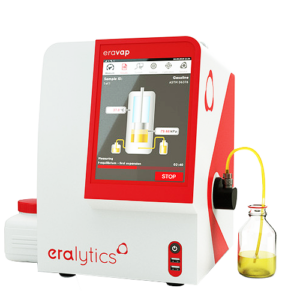A design you can depend on
The innovative design of Ayalytical Instruments cast aluminum alloy corrosion tester guarantees full compliance with ASTM D4340. This apparatus is ideal for evaluating the effectiveness of engine coolants in combating corrosion of aluminum casting alloys under heat-transfer conditions that may be present in aluminum cylinder head engines. It is vital that engine coolants effectively prevent such heat-transfer corrosion, which may otherwise deposit on interior radiator surfaces, thereby reducing heat-transfer efficiency of the radiator and leading to eventual overheating and boil-over of the cooling system. Using this aluminum corrosion apparatus, a heat flux is established via a cast aluminum alloy like that used for engine cylinder heads. The alloy is exposed to the coolant test sample under a specified pressure and temperature for approximately one week. The effectiveness of the coolant in preventing corrosion is then evaluated based on the weight change of the alloy specimen before and after testing.
Designed with productivity and reliability in mind, this dependable corrosion tester features dual intricate heat transfer corrosion cells, each of which are comprised primarily of a Pyrex glass tube containing A truss with stainless steel top and bottom plates and central tie rods, a heat transfer bar,, a pressure relief safety valve to protect against bursting, a pressure manometer (0-400KPA), and a 950W insulated band heater for the safe and constant heating of test samples. Heating is easily and accurately controlled via electrical thermoregulators with thermocouples and digital timers. Included with this setup are standard glass O-ring joints and other essential fittings. The solidly-constructed aluminum tester casing in which the heat transfer corrosion cells are enclosed features an additional external acrylic safety shield for enhanced operator protection during testing. This sturdy, easy-to- operate alloy corrosion apparatus features dual heat transfer corrosion cells for the simultaneous testing of two coolant samples, covers working temperatures ranging from ambient to 160C (320F), and maintains 0.05C for when stability is absolutely critical.
Features
 CORROSION OF CAST ALUMINUM ALLOYS fully compliant with ASTM D4340, providing both standard method and refined methodology.
CORROSION OF CAST ALUMINUM ALLOYS fully compliant with ASTM D4340, providing both standard method and refined methodology.Models
| Models | Positions | |
| Model 2220 | CORROSION CAST ALUMINUM ALLOYS APPARATUS | |
| Model 2220/2 | CORROSION CAST ALUMINUM ALLOYS APPARATUS (2 POSITIONS) |
Accessories
The following accessories are recommended for purchase in sequential order (see eStore):
| 1st Year: | ALUMINUM TEST SPECIMEN x2 VITON GASKET, pack of 10 pcs x5 |
| 2nd Year: | Same as 1st year |
| Remaining Parts: | ALUMINUM TEST SPECIMEN Ø6.5×1.3 cm PUMP PYREX TUBE PRESSURE GAUGE 0-400 KPa THERMOCOUPLE J HEATER DIGITAL THERMOREGULATOR TIMER DIGITALE STATIC RELAY BIPOLAR GREEN SWITCH BIPOLAR YELLOW SWITCH |
Specs
| Test Method Compliance | ASTM D4340 | |
| Temperature | from ambient to 160°C (320°F) | |
| Stability | ±0.5°C | |
| Power supply | 230V ±10% 50/60Hz | |
| CORROSION CAST ALUMINUM ALLOYS APPARATUS | ||
| Power | 950W | |
| Weight | 18 kg | |
| Dimensions | 26x34x110 cm | |
| CORROSION CAST ALUMINUM ALLOYS APPARATUS (2 POSITIONS) | ||
| Power | 1900W | |
| Weight | 35 kg | |
| Dimensions | 35x43x118 cm | |
| Shipping weight | ||
| Dimensions with crate |









